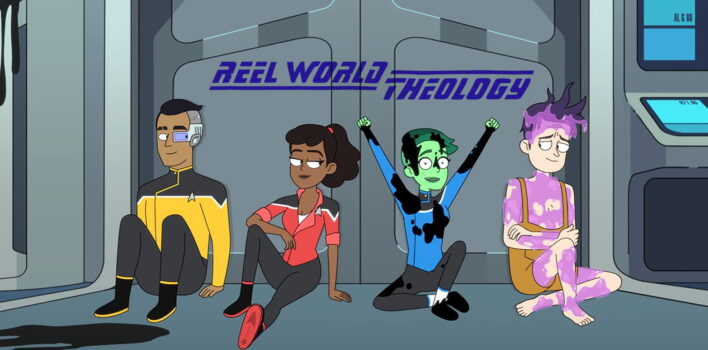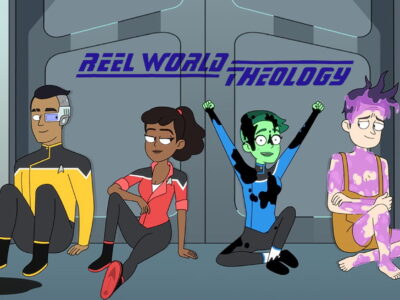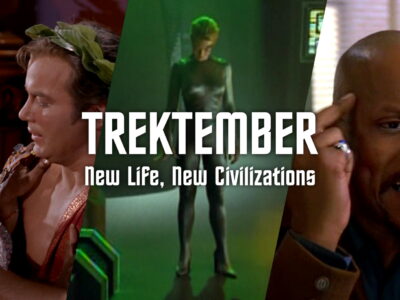“Much Ado About Boimler” – Star Trek: Lower Decks S1E07
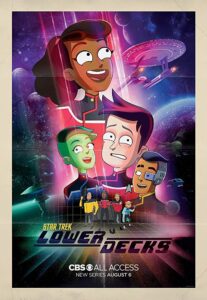 I’ve always loved Star Trek’s penchant for forcing characters together who don’t really interact much in a usual story; you see Sisko & Kira scenes and O’Brien and Bashir scenes all the time, but every once in a while the show throws you something like “Past Tense,” where Siko & Bashir are together for the entire two-parter. Same with Uhura and Chekov in Star Trek IV: The Voyage Home, or Burnham & Stamets in “Magic to Make the Sanest Man Go Mad.”
I’ve always loved Star Trek’s penchant for forcing characters together who don’t really interact much in a usual story; you see Sisko & Kira scenes and O’Brien and Bashir scenes all the time, but every once in a while the show throws you something like “Past Tense,” where Siko & Bashir are together for the entire two-parter. Same with Uhura and Chekov in Star Trek IV: The Voyage Home, or Burnham & Stamets in “Magic to Make the Sanest Man Go Mad.”
Lower Decks has generally sorted the core ensigns into two pairs: Mariner & Boimler go together, and Tendi & Rutherford go together. “Much Ado About Boimler” gives us some quality time with Boimler & Tendi; his neuroses and her effusiveness go together surprisingly well, all told, and newcomer Captain Ramsey brings out the best and worst in Mariner. Though the episode does make me wonder what Rutherford is up to.
Episode 7 of this season is a good-but-not-great entry for this above-average season. It didn’t feel like a sprint; I think the writers finally have the pacing of this show down to a science. They dip a bit back into the ridiculous for some comedic beats, but they all feel grounded in the sci-fi (which is solid but subtle).
And the character work, which really shines this time around. At least, for the most part. The episode is about broken people; and, in a way, isn’t every story about that?
Spoiler warning: plot and ending details for “Much Ado about Boimler” follow.
 As good as the characterization was, I thought the episode fumbled a bit at the end: the show was building to a great reveal about Mariner and what makes her tick, a breakthrough about how she came to be the number one slacker in Starfleet and why she was on the Harry Kim career track. Yet the episode walks us right up to the line of that catharsis, drops the floor out from beneath us—and we fall about a quarter inch into a lukewarm puddle of “stuff to figure out.”
As good as the characterization was, I thought the episode fumbled a bit at the end: the show was building to a great reveal about Mariner and what makes her tick, a breakthrough about how she came to be the number one slacker in Starfleet and why she was on the Harry Kim career track. Yet the episode walks us right up to the line of that catharsis, drops the floor out from beneath us—and we fall about a quarter inch into a lukewarm puddle of “stuff to figure out.”
Still, in a way, that weakness identifies one of the strengths of the story: Mariner is a broken person (though we don’t know why) whose brokenness affects her relationship with Ramsey. We don’t get to see why, just like so often in real life. We don’t get to know what has hurt her or how to help.
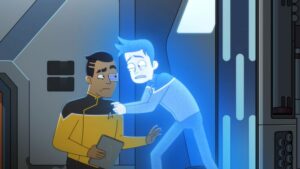 Boimler’s malady, on the other hand, is quite clear (like the rest of him). He’s “just phasing,” but an overwhelmingly loud transporter harmonic and a bright, ghostly form have overtaken him. He’s as miserable as he makes everyone else until Rutherford figures out how to “mute” him; and even after that, he’s anxious about the upcoming trip to Division 14’s “Farm.”
Boimler’s malady, on the other hand, is quite clear (like the rest of him). He’s “just phasing,” but an overwhelmingly loud transporter harmonic and a bright, ghostly form have overtaken him. He’s as miserable as he makes everyone else until Rutherford figures out how to “mute” him; and even after that, he’s anxious about the upcoming trip to Division 14’s “Farm.”
It seems for good reason, too; as he meets an ensign who has accelerated growth on one side of his body and reverse aging on the other (huge kudos to Nolan North for pulling that voice feat off).
“Wow, I never knew there were this many accidents in Starfleet.”
“Which is exactly why Division 14 exists: to hide the mistakes Starfleet would like to ignore.”
“Oh! Well that doesn’t sound very Starfleet-y.”
“The admirals wouldn’t want to jeopardize the allegiance of their officers by forcing them to work alongside a man whose body is equal parts accelerated growth and reverse aging. That’s right: stare at me.”
“I…I wasn’t staring.”
“The freak infected by an alien horse bite, doomed to live out his days as half a rascal. Everyone would rather avert their gaze instead of curing us. We’re inconvenient.”
—Boimler, Old Baby Ensign, and Tendi, “Much Ado About Boimler”
Old Baby Ensign tells Boimler that the Edosian officer (a sweet callback to the original Animated Series’ navigator, Arex) is really lying to all of them, communicating a worry that all of us have at one point or another: that we’re too broken, too sick, too much work to help. We look ugly, we don’t reflect well on those who love us, we’re an embarrassment to everyone who loves us. Our friends and family (maybe even God) should focus on someone more healthy. This is a lie.
 And it may be getting worse, particularly when it’s so difficult to come together and overcome these dark feelings (and it was tough even before the pandemic). Depression rates, suicide rates, general feelings of self-loathing are on the rise, and many churches try to give pat answers: “just have faith,” “turn that frown upside down” sort of answers that address the optics by agreeing with the accusation.
And it may be getting worse, particularly when it’s so difficult to come together and overcome these dark feelings (and it was tough even before the pandemic). Depression rates, suicide rates, general feelings of self-loathing are on the rise, and many churches try to give pat answers: “just have faith,” “turn that frown upside down” sort of answers that address the optics by agreeing with the accusation.
Worse still, some churches double down on this feeling by telling their parishioners a half-true, half-baked version of the Calvinist doctrine of Total Depravity—“you’re more sinful than you could possibly imagine”—without also communicating the truth. And it’s understandable if you feel this way: you are wounded. That’s painful part and parcel for people in a fallen world.
But that doesn’t mean you’re not worth saving. On the contrary, Jesus specifically said that He came to save you because you’re broken. “It is not the healthy who need a doctor,” he says in Mark 2:17, “but the sick.” You’re sinful, you’re broken, but God knows everything about you and still loves and pursues you anyway because you’re worth loving and pursuing.
Jesus Christ says, “Gather to me, all you lost, you poor, you dead!
I’m your sacrifice, your ransom, I was given in your stead
I have found you, freed you, healed you, my compassion you can trust,
I redeem the undeserving, I am generous with my love.”
—Nathan Partain, “Bring Your Sick”
 At the last moment, Boimler has been rejected by everyone. Even the rejects. He’s too broken even for the broken, and they’re getting rid of him. It’s the end, and the airlock opens…allowing Boimler to roll out onto the verdant lawn of a lush planet, with a shining resort on a sparkling lake.
At the last moment, Boimler has been rejected by everyone. Even the rejects. He’s too broken even for the broken, and they’re getting rid of him. It’s the end, and the airlock opens…allowing Boimler to roll out onto the verdant lawn of a lush planet, with a shining resort on a sparkling lake.
In his weakest moment, the truth was revealed to him and to the other tough medical cases: they are worth what had been promised them. They aren’t just an inconvenience. Starfleet won’t just leave them in a ship to rot.
And you’re worth it, too.


